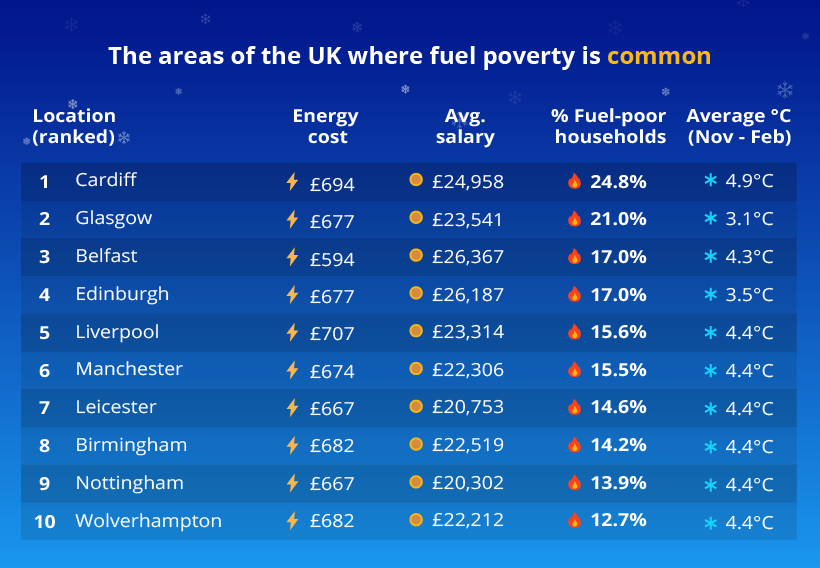Cardiff residents most at risk of fuel poverty in UK winter lockdown says new study
Cardiff, Glasgow and Belfast among the top three cities in the UK most at risk of fuel poverty
Approximately 2.4 million households in England struggle to pay their energy bills each year.
That’s according to new research compiled and analysed by Confused.com, which found that people in Cardiff, Glasgow and Belfast are most at risk of ‘fuel poverty’, with over 282,000 people across these cities struggling to pay their energy bills.
Many households across the UK may not realise what it means to be in fuel poverty. This is when a household has fuel costs that are above average, a household income that is below average or an above-average fuel usage– it can also be a combination of all three. If this household was to then pay their fuel bills, they would find themselves below the UK poverty line2.
With people spending more time in the comfort of their own homes, and the financial pressures many have faced over the past 12 months, it’s more important than ever for households to be aware of their energy consumption and risk of fuel poverty this winter.
To bring light to this issue, Confused.com has analysed the government’s Annual Fuel Poverty Report data as well as temperature data, average annual earnings and the average energy bills to uncover which cities are more likely to be subject to fuel poverty.
You can see the full study here https://www.confused.com/gas-electricity/fuel-poverty
The top areas most at risk of fuel poverty

According to the data, almost 91,000 – equivalent to one in four (25%) – households in Cardiff were considered to be fuel poor last year, putting it top of the list for the cities most at risk of fuel poverty. In the Welsh capital, the average annual energy bill was just under £700, while residents earned close to £25,000 per year, on average.
Henry Muss, climate resilience expert and founder of The Climate Resilience Company, explains: “Apart from the ratio of household income to energy bills being the main reason for the high levels of fuel poverty in Cardiff, another may be the quality and age of the housing stock.
“When compared with the other UK nations, in 2017 Wales had the lowest percentage of dwellings in energy performance certificate (EPC) band C or above, with just 28%. England had 30% and Scotland had 42% of dwellings above EPC band C. Older houses are likely to be more difficult to heat, having poor levels of insulation, resulting in higher energy bills and greater levels of fuel poverty.”
Glasgow came in second, with over one in five (21%) considered to be fuel poor last winter. The Scottish city’s high population means that close to 133,000 people are considered to be in fuel poverty here. Winter temperatures also dropped to just 2.5°C last February causing residents to fork out more on heating.
Reducing your risk of fuel poverty
Fuel poverty might sound like a thing of the past, but data shows that a huge amount of people are still in fuel poverty every year (approximately 2.4 million households in England 2018).
Alongside COVID-19, this is putting people under a lot of pressure financially, and might make fuel poverty more common than ever.
But fuel poverty isn’t a widely discussed topic, so no doubt there are many households that aren’t aware that they are at risk. Knowing whether they fall into this category, and what they can do to prevent it, can be confusing for those completely unaware.
Confused.com’s energy experts suggest there are some things people can do to reduce the amount they’re paying for their energy.
Top tips include:
Don’t let the heat escape – simple measures can make a big difference – keep curtains closed to keep warmth in a room and draught excluders to keep heat in.
Skip standby mode – switch electrical items off at the socket when not in use. Standby mode can be a massive drain on your energy bills.
Only heat the rooms you use – turn off radiators in spare rooms and switch the heating off when you go out to ensure you’re always there to benefit from the heat!
Know what you’re entitled to in terms of winter grants and discounts – the Winter Fuel Allowance, Cold Weather Payment and Warm Home Allowance are all available to those who qualify.
Switch tariffs – make sure you’re on the cheapest energy tariff. Even if you have a prepayment card meter, you can switch tariffs to save money
Confused.com’s energy expert Max Green comments: “Fuel poverty affects so many of us across the UK. Worryingly, potentially millions of people are at risk, but they may not necessarily know it. Households with a lower than average income, high energy requirements or expensive energy bills are at risk of falling below the UK poverty line.
“But this doesn’t mean to say they can’t get out of it. Improving insulation to stop heat escaping, using a timer for outdoor lights or reducing the number of radiators on in the house are all steps towards improving fuel spend. This past 12 months has been extremely challenging for so many of us and we want to help people to understand that there are ways we can save on our energy bills. That’s why we’ve compiled our top tips to improving fuel efficiency in the home.”